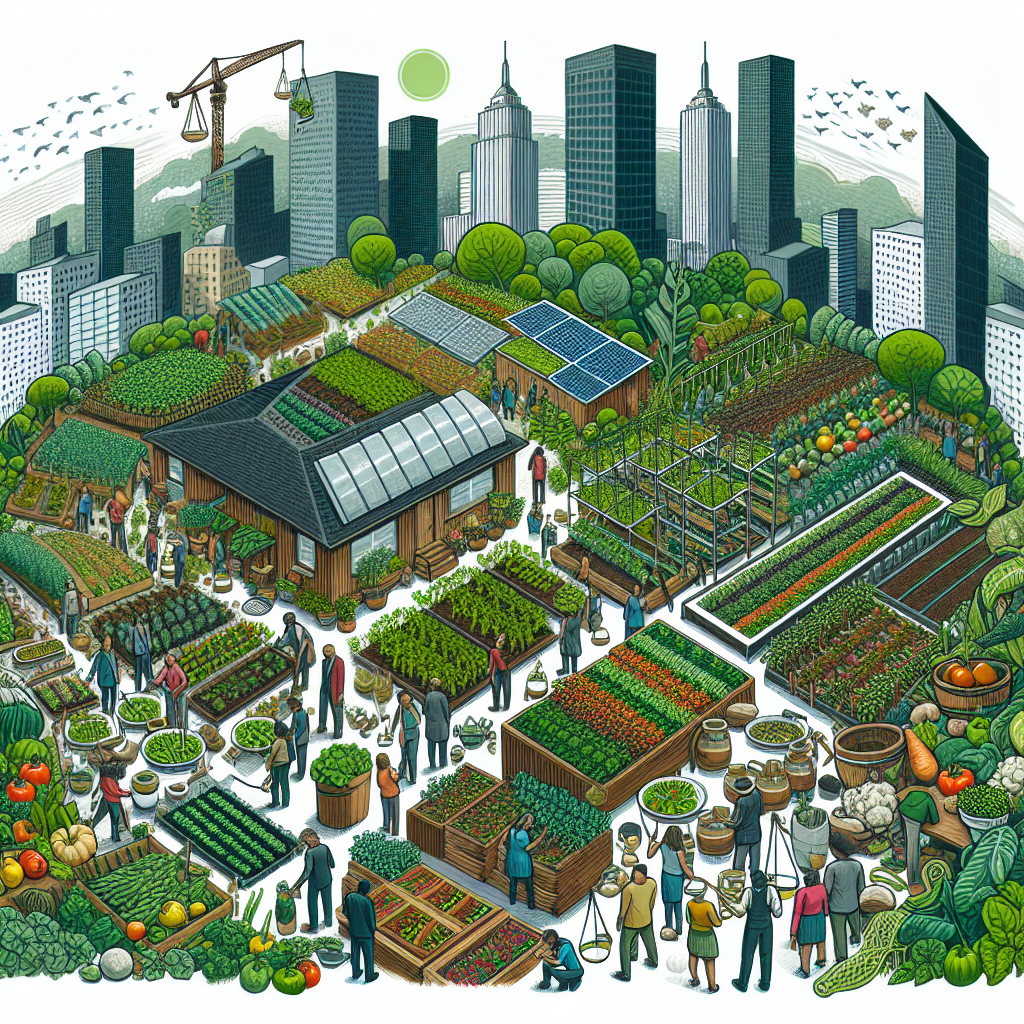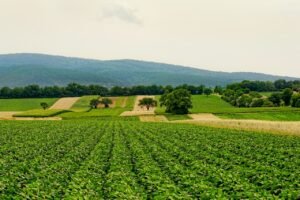
In this article, we will take a closer look at the role of urban farming in achieving food justice. As cities continue to expand and populations grow, it becomes increasingly important to find sustainable and inclusive solutions to address food inequality. Urban farming offers a unique opportunity to not only provide fresh and nutritious food to underserved communities but also to empower individuals and promote environmental sustainability. By exploring the various ways urban farming can tackle food justice and equity issues, we can better understand its potential to transform our cities into healthier and more equitable places for all. So, let’s delve into the fascinating world of urban farming and discover how it can play a vital role in creating a more just and sustainable food system for everyone.
Definition of Food Justice
Understanding Food Justice
Food justice is the concept that everyone, regardless of their income, race, or geographic location, has the right to access healthy and culturally appropriate food. It focuses on creating an equitable food system that prioritizes the needs of marginalized communities and addresses systemic inequalities. Food justice aims to address the root causes of food insecurity and ensure that everyone has the resources and opportunities to make choices that promote their health and well-being.
Exploring the Components of Food Justice
Food justice encompasses various components that work together to create a more equitable food system. These components include access to fresh and nutritious food, community engagement and empowerment, environmental sustainability, social and economic justice, and policy advocacy. By addressing these components, food justice initiatives strive to create a more just and inclusive food system that benefits individuals, communities, and the environment.
What is Urban Farming?
Defining Urban Farming
Urban farming refers to the practice of cultivating, processing, and distributing food within urban areas. It involves growing a wide range of crops, raising animals, and producing food products in both small and large-scale operations. Urban farming can take place in various settings, including rooftops, community gardens, vacant lots, and indoor spaces. It is a sustainable and innovative approach to food production that allows urban dwellers to access fresh and locally grown food.
Types of Urban Farming
There are several types of urban farming that cater to different spaces and resources available in urban environments. Rooftop gardens utilize the roof space of buildings to grow crops, utilizing vertical or container gardening techniques. Community gardens are shared spaces where individuals or groups come together to grow their own food. Vacant lot farming involves converting unused urban areas into productive agricultural spaces. Indoor farming utilizes technology such as hydroponics or aquaponics to grow plants indoors without soil. Each type of urban farming has its own advantages and can contribute to increasing food security and addressing food justice in urban areas.

The Impacts of Food Insecurity
Understanding Food Insecurity
Food insecurity refers to the lack of consistent access to adequate and nutritious food for an active and healthy lifestyle. It affects individuals and communities, often due to limited financial resources, transportation barriers, and systemic inequalities. Food insecurity can have severe negative impacts on health, education, and overall well-being.
Exploring the Consequences of Food Insecurity
Food insecurity can lead to numerous consequences, including malnutrition, chronic health issues, poor academic performance, and economic disparities. Individuals experiencing food insecurity often resort to consuming cheap, processed foods that are high in calories but low in nutritional value. This can contribute to the prevalence of diet-related diseases such as obesity, diabetes, and cardiovascular conditions. Additionally, food insecurity can also perpetuate cycles of poverty and hinder community development.
Benefits of Urban Farming
Promoting Access to Fresh Food
Urban farming plays a crucial role in promoting access to fresh and locally grown food. By cultivating crops and raising animals in urban areas, urban farmers can distribute their produce directly to local communities, reducing the reliance on long-distance transportation and the associated carbon emissions. This proximity allows for the availability of fresh produce that is both nutritious and culturally appropriate, improving the overall health outcomes of communities.
Enhancing Food Security
Urban farming contributes to enhancing food security by increasing the availability and accessibility of food in urban areas. By growing food locally, urban farmers reduce reliance on external food sources, which can be vulnerable to disruptions in supply chains. This localized production helps create a more resilient food system, ensuring that communities have a consistent and reliable supply of nutritious food.
Reducing Food Deserts
Food deserts are areas with limited access to affordable and nutritious food, typically found in low-income communities. Urban farming initiatives can help combat food deserts by establishing community gardens, rooftop farms, and urban agriculture projects in these underserved areas. By bringing fresh food production closer to where it is needed the most, urban farming helps reduce the barriers and challenges faced by residents in accessing healthy food options.
Improving Nutritional Health
Urban farming encourages the consumption of fresh, locally grown produce, which can significantly improve the nutritional health of individuals and communities. By having access to a diverse range of fruits, vegetables, and herbs, urban dwellers can incorporate more wholesome and nutrient-rich foods into their diets. This can help reduce the prevalence of diet-related diseases, promote healthy eating habits, and contribute to overall wellness.

Challenges and Barriers to Urban Farming
Limited Space
One of the primary challenges faced by urban farming initiatives is the limited availability of space in urban areas. Cities are often densely populated, and finding suitable land for agriculture can be a significant obstacle. However, innovative solutions such as vertical farming, rooftop gardens, and hydroponics have emerged to maximize the use of limited space and overcome these challenges.
Urban Infrastructure
The lack of suitable infrastructure in urban areas can pose barriers to urban farming. Issues such as inadequate water supply, limited access to electricity, and soil contamination can hinder the establishment and growth of urban farming initiatives. Addressing these infrastructure challenges requires investment in urban agricultural infrastructure, including water management systems, renewable energy solutions, and soil remediation efforts.
Legislative and Policy Constraints
Urban farming often faces regulatory hurdles and policy constraints that can impede its growth and sustainability. Outdated zoning laws, restrictive land use policies, and a lack of support from local governments can limit the expansion of urban farming initiatives. Advocacy and policy reform are needed to create an enabling environment for urban agriculture, including zoning ordinances that allow for urban farming and incentives for landowners to dedicate their properties for agricultural use.
Access to Resources and Funding
Access to resources and funding is a significant barrier for many urban farming projects. The high costs associated with acquiring land, purchasing equipment, and implementing sustainable practices can be prohibitive, especially for small-scale farmers and community-based initiatives. Providing financial support, grants, and subsidies, as well as developing partnerships with local businesses and organizations, can help mitigate these challenges and ensure the long-term viability of urban farming initiatives.
Successful Urban Farming Initiatives
Case Study 1: Green City Acres
Green City Acres is a successful urban farming initiative based in Kelowna, Canada. They specialize in market gardening on small plots of land, utilizing organic and sustainable farming practices. Through their CSA (Community Supported Agriculture) program and farmer’s market sales, they provide fresh, local, and organic produce to the community. Green City Acres has demonstrated the economic viability and sustainability of urban farming while promoting food justice and environmental stewardship.
Case Study 2: Growing Power
Growing Power, based in Milwaukee, Wisconsin, is a renowned urban farming organization that focuses on providing equal access to healthy, high-quality food for underprivileged communities. They utilize a combination of aquaponics, vermicomposting, and community engagement initiatives to cultivate food and empower local residents. Growing Power has served as a model for urban farming initiatives worldwide and has created lasting impacts on food justice and community development.
Case Study 3: The Food Project
The Food Project, operating in Massachusetts, engages young people in urban agriculture and community building. They utilize diverse farming techniques, including community gardens, school gardens, and urban farms, to grow food and promote education around sustainable agriculture. The Food Project empowers youth to develop leadership skills and knowledge about food systems while addressing food justice disparities in their communities.

Community Engagement and Empowerment
Involving Local Communities
Community engagement is a crucial aspect of successful urban farming initiatives. By involving local residents in the planning, implementation, and maintenance of urban farming projects, communities become active participants in their own food production and decision-making processes. This involvement fosters a sense of ownership, collective responsibility, and pride, leading to stronger and more resilient communities.
Educating and Empowering Citizens
Urban farming initiatives provide opportunities for education and empowerment, equipping individuals with the knowledge and skills needed to grow their own food and make informed choices about their health and well-being. Through workshops, training programs, and educational resources, urban farmers and community organizations can help individuals develop a deeper understanding of sustainable agriculture, food systems, and nutrition. This knowledge empowers individuals to advocate for change and make positive contributions to their communities.
Building Relationships and Partnerships
Successful urban farming initiatives often rely on building strong relationships and partnerships with various stakeholders, including local governments, community organizations, businesses, and educational institutions. These partnerships allow for resource sharing, knowledge exchange, and collaboration in addressing the challenges faced by urban farming projects. By working together, these stakeholders can create a supportive ecosystem that nurtures the growth and sustainability of urban agriculture and food justice initiatives.
Implications for Social and Environmental Justice
Addressing Food Desert Disparities
Urban farming plays a crucial role in addressing food desert disparities, where certain communities have limited access to fresh and healthy food options. By establishing urban farms and community gardens in these underserved areas, urban farming initiatives can provide residents with immediate access to nutritious food and create long-term solutions to address food inequities. This approach promotes social justice by ensuring that everyone, regardless of their socioeconomic status, can access fresh and healthy food.
Reducing Waste and Emissions
Urban farming contributes to reducing food waste and greenhouse gas emissions associated with long-distance food transportation. By cultivating food locally, urban farmers eliminate the need for extensive packaging, refrigeration, and transportation, thereby reducing the carbon footprint and environmental impact of the food system. This sustainable approach to food production aligns with the principles of environmental justice, as it helps protect natural resources and mitigate climate change.
Promoting Sustainable Practices
Urban farming encourages the adoption of sustainable farming practices such as organic farming, composting, and water conservation. By minimizing the use of synthetic chemicals and prioritizing environmentally friendly methods, urban farmers promote ecological sustainability and stewardship. These practices help protect soil health, conserve water resources, and preserve biodiversity, contributing to a more sustainable and resilient urban environment.
Creating Green Job Opportunities
Urban farming initiatives can play a vital role in creating green job opportunities for local communities. As the demand for urban-grown produce increases, there is a growing need for skilled farmers, educators, researchers, and agricultural technicians. By investing in training and employment programs, urban farming can provide meaningful and sustainable job opportunities, particularly in marginalized communities. This supports economic justice by promoting equitable access to employment and addressing unemployment and poverty.

Policy Recommendations for Supporting Urban Farming
Increasing Access to Land
To support urban farming initiatives, policymakers should prioritize increasing access to land for agricultural purposes in urban areas. This can be achieved by allocating public land for urban agriculture, reforming zoning laws to allow for agricultural activities, and facilitating land-sharing agreements between property owners and urban farmers. Municipalities can also explore creative solutions such as vacant land tax incentives or land trust programs to support urban farming ventures.
Streamlining Regulations
Streamlining regulations pertaining to urban farming can help remove barriers and create an enabling environment for urban farmers. Local governments should revisit zoning ordinances, permitting requirements, and food safety regulations to ensure they are supportive of urban farming practices. By simplifying and clarifying the regulatory framework, policymakers can facilitate the establishment and expansion of urban farming initiatives.
Providing Financial Support
Financial support is critical for the success of urban farming initiatives, especially for small-scale farmers and community-based projects. Policymakers can allocate grants, subsidies, and low-interest loans specifically for urban farming ventures. Additionally, public-private partnerships and crowdfunding platforms can help raise funds and resources to support urban farming initiatives. By providing financial support, policymakers can incentivize the growth of urban agriculture and promote food justice.
Investing in Education and Training
Investing in education and training programs is essential to build the capacity and skills of urban farmers and community members. Policymakers should allocate resources to develop training programs, workshops, and educational materials that cover topics such as sustainable agriculture, food systems, and nutrition. Additionally, integrating urban farming into school curricula and supporting vocational training programs can help create a future generation of urban farmers and food justice advocates.
Conclusion
The Potential of Urban Farming in Achieving Food Justice
Urban farming presents immense potential in addressing food justice and equity issues. By promoting access to fresh food, enhancing food security, reducing food deserts, and improving nutritional health, urban farming initiatives create a more equitable and sustainable food system. Through community engagement, education, and partnerships, urban farming empowers individuals and builds resilient communities. Moreover, urban farming has far-reaching implications for social and environmental justice, addressing disparities, reducing waste and emissions, promoting sustainable practices, and creating green job opportunities.
Continued Action and Collaboration
To fully realize the potential of urban farming in achieving food justice, continued action and collaboration are necessary. Policymakers, community organizations, businesses, and individuals must work together to overcome barriers and create supportive environments for urban farming initiatives. By implementing policy recommendations, supporting research and innovation, and investing in education and training, stakeholders can pave the way for a more just, sustainable, and equitable food system. Through ongoing collaboration and commitment, urban farming can play a transformative role in achieving food justice and fostering vibrant and healthy communities.








